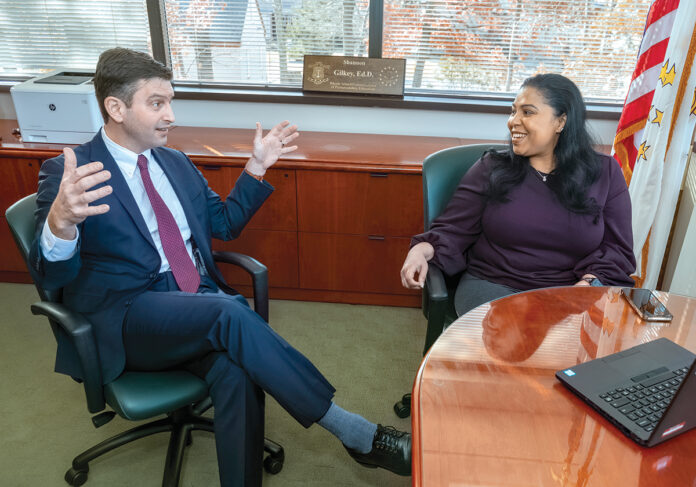While the state navigates the labor shortage, the R.I. Office of the Postsecondary Commissioner is seeking to widen the talent pipeline as Rhode Island sees higher education enrollment decline and the workforce growing older.
The commissioner’s office is looking to launch a postsecondary credential registry tool aimed at augmenting the qualifications of job seekers while making them more visible to prospective employers.
Shannon Gilkey, Rhode Island’s commissioner on postsecondary education, said the creation of an online credential registry is critical for building and sustaining the local workforce. “We are at an inflection point with the labor shortages and the economy,” Gilkey said. “That’s why this is needed now.”
Other state officials agree. Gov. Daniel J. McKee’s goal is to have more than 70% of the workforce holding a nondegree credential by 2030. The goal is written into the governor’s Rhode Island 2030 Plan, and he recently proposed creating a “higher ed academy” as a workforce development initiative.
Gilkey said his office would like to see that 70% goal reached by 2025. “It’s fairly ambitious,” he said. “You start with what the state needs, and that’s kind of our north star right now.”
Gilkey said a credentials registry would make it easier for an employer to envision a worker doing a specific job, leading to greater hiring trends. He noted that Rhode Island would be one of a handful of states deploying it.
A credential is an official document verifying qualification for a specific skill that can be aligned with a college degree.
A credential registry would collect, maintain and connect information on all types of credentials, from diplomas to apprenticeships and from licenses to doctorates, and it would make that information easily accessible for individuals and employers.
“Some challenges presented by a credentialing tool include lack of digital formats that are accepted and understood by higher education,” said Gena Bianco, dean of University College at Roger Williams University. “Current higher education credentials are very fragmented, with dual enrollments, study-abroad programs, badges and various certifications.”
Bianco said that universities might have to transform their transcripts to be able to accommodate all of the credentials that are being offered.
Gilkey said the focus on a registry was spurred by census data that showed 52.9% of the local population holds some form of postsecondary credential. Such credentials allow job seekers to land higher-paying positions without spending years attending college, the report said.
The report noted that the two most common occupational fields for certification are health care at 17% of the workforce holding some type of credential, and business management and operations at 14%. Meanwhile, 27% of adults nationwide hold a nondegree credential – a postsecondary certificate, a certification, or a license.
Gilkey’s office reports that undergrad fall enrollment has declined since 2017 for the state’s public colleges. Rhode Island College decreased 25.8% during that period, while the Community College of Rhode Island dipped 18.9%, and the University of Rhode Island saw a 4% decline.
Tammy V. Warner, the associate commissioner of postsecondary academic and student affairs, said that a decline in undergraduate enrollment before 2020 was expected and related to demographic shifts, while the more recent decreases are due to the COVID-19 pandemic.
Warner said the drops in enrollment of 3.9% in 2020 and 7.6% in 2021 are in line with national averages reported by the National Student Clearinghouse that show about a 3% annual decrease in college enrollment.
Gilkey said employers need to quickly garner a clear understanding of credentials, and how the pipeline of education and training can efficiently prepare individuals for the workforce.
There is a need for modernization of Rhode Island’s information technology infrastructure to help build and maintain the registry, he said.
Gilkey hopes to link the registry to the R.I. Department of Labor and Training, and its credentialing system and training programs. Gilkey has been collaborating with DLT Director Matthew Weldon, as well as Angélica Infante-Green, Rhode Island’s commissioner of elementary and secondary education, on the program.
Weldon said the registry will provide data-driven information to help educate the state’s approach to workforce development.
“This project builds on our interagency efforts to ensure Rhode Islanders have the skills they need to access opportunities in the economy, and that businesses can find the talent they need to thrive in our state,” Weldon said.
Gilkey said the program would help his office know the number and types of credentials in the state and who holds them, and the composition of the workforce and its training levels.
On the flip side, it would help employers understand what value they hold for workers, and how many people have the credentials they require.
Gilkey said the registry began with the Massive Open Online Courses movement of 2008, as an online resource.
Other states, such as California and Kentucky are modernizing their data systems. Alabama, Florida and North Carolina are examples of states using credential registries that Rhode Island can use as a starting point for credentials across higher education that align with the labor market.
“Higher education has been trying to wrestle with it as an industry for several years, but now at this economic tipping point it’s really good timing for use in Rhode Island,” Gilkey said.
UPDATE clarified the status of credential registries in California, Kentucky,Alabama, Florida and North Carolina.
Cassius Shuman is a PBN staff writer. Email him at Shuman@PBN.com.












